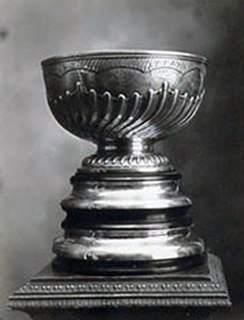 W
WThe 1915 Stanley Cup Finals was played from March 22–26, 1915. The Pacific Coast Hockey Association (PCHA) champion Vancouver Millionaires swept the National Hockey Association (NHA) champion Ottawa Senators three games to none in a best-of-five game series. The finals were played in Vancouver, with games one, three and five played under PCHA rules. The Millionaires became the first team from the PCHA to win the Cup. This was the second Stanley Cup championship series between the champions of the NHA and the PCHA and the first held in a PCHA rink.
 W
WThe 1924 Stanley Cup Finals saw the National Hockey League (NHL) champion Montreal Canadiens defeat the Western Canada Hockey League (WCHL) champion Calgary Tigers two games to none in the best-of-three game series. It was Montreal's fourth appearance in the Finals and second championship.
 W
WThe 1929 Stanley Cup Finals was played by the defending champion New York Rangers and the Boston Bruins. This was the first time in Stanley Cup Finals history that two American-based teams met in the Finals. Boston won the series to win its first championship.
 W
WThe 1970 Stanley Cup Finals was the championship series of the National Hockey League's (NHL) 1969–70 season, and the culmination of the 1970 Stanley Cup playoffs. It was a contest between the Boston Bruins and the St. Louis Blues, who appeared in their third consecutive finals series. The Bruins were making their first appearance in the Stanley Cup Finals since 1958. The Bruins won the series, four games to none. It was Boston's first Stanley Cup victory in 29 years. Bobby Orr scored the Cup-winning goal on Mother's Day against St. Louis' veteran Hall of Fame goalie Glenn Hall, with an assist from close friend and teammate "The Turk" Derek Sanderson, at forty seconds of overtime. The subsequent image of Orr flying through the air, his arms stretched out in victory — — is considered the most famous and recognized hockey image of all time. With the win, the Bruins became the first American team to win the Stanley Cup since the Chicago Blackhawks in 1961. The Blues, who had gone to the Finals their first three years in the league, would eventually lose each of the three series in four-game sweeps. St. Louis would not appear in a Stanley Cup Finals again until 2019, ending the second longest Finals drought in league history.
 W
WThe 1972 Stanley Cup Finals was the championship series of the National Hockey League's (NHL) 1971–72 season, and the culmination of the 1972 Stanley Cup playoffs. It was contested between the Boston Bruins and the New York Rangers. It was the Rangers first appearance in the finals since 1950. The Bruins were making their first appearance since their victory in the 1970 Finals. It was the second Boston-New York Final series, the other being the 1929 Finals. The Bruins won the best-of-seven series, four games to two.
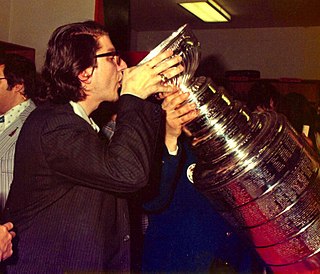 W
WThe 1974 Stanley Cup Final was the championship series of the National Hockey League's (NHL) 1973–74 season, and the culmination of the 1974 Stanley Cup playoffs. It was contested between the Boston Bruins and the Philadelphia Flyers. The Flyers made their first Final appearance and the Bruins returned to the Final for the third time in five years, having won the Stanley Cup in 1970 and 1972. The Flyers won the best-of-seven series, four games to two, becoming the first team from the 1967 Expansion to win the Stanley Cup, as well as the first non-Original Six Cup champion since the Montreal Maroons in 1935.
 W
WThe 1984 Stanley Cup Finals was the championship series of the National Hockey League's (NHL) 1983–84 season, and the culmination of the 1984 Stanley Cup playoffs. It was contested between the Edmonton Oilers and the defending champion New York Islanders. The upstart Oilers won the best-of-seven series, four games to one, to win their first Stanley Cup, becoming the third post-1967 expansion team and first former World Hockey Association team to win the Cup, and also the first team based west of Chicago to win the Cup since the WCHL's Victoria Cougars became the last non-NHL team to win it in 1925.
 W
WThe 1985 Stanley Cup Finals was the championship series of the National Hockey League's (NHL) 1984–85 season, and the culmination of the 1985 Stanley Cup playoffs. It was contested between the defending champion Edmonton Oilers and the Philadelphia Flyers. The Oilers would win the best-of-seven series, four games to one, to win their second Stanley Cup. It was also the sixth straight Finals contested between teams that joined the NHL in 1967 or later. As of 2020, this is also the last time that a team, defending champion or runner-up, would appear in the Finals for the third straight season. This would be the third of eight consecutive Finals contested by a team from Alberta, and the second of five consecutive Finals to end with the Cup presentation on Alberta ice.
 W
WThe 1986 Stanley Cup Finals was the championship series of the National Hockey League's (NHL) 1985–86 season, and the culmination of the 1986 Stanley Cup playoffs. It was contested between the Calgary Flames and the Montreal Canadiens. The Canadiens would win the best-of-seven series, four games to one, to win their 23rd Stanley Cup, and their 17th in their last 18 Finals appearances dating back to 1956.
 W
WThe 1987 Stanley Cup Finals was the championship series of the National Hockey League's (NHL) 1986–87 season, and the culmination of the 1987 Stanley Cup playoffs. It was contested between the Edmonton Oilers and the Philadelphia Flyers. The Oilers won the series 4–3, for their third Stanley Cup victory. This would be the fifth of eight consecutive Finals contested by a team from Alberta, and the fourth of five consecutive Finals to end with the Cup presentation on Alberta ice.
 W
WThe 1989 Stanley Cup Finals was the championship series of the National Hockey League's (NHL) 1988–89 season, and the culmination of the 1989 Stanley Cup playoffs. It was contested between the Calgary Flames and the Montreal Canadiens, the top two teams during the regular season. This was the second time in the decade after 1986 that the Canadiens and Flames met in the Finals. To date, the 1989 series also remains the last time that two Canadian teams faced each other for the Stanley Cup.
 W
WThe 1990 Stanley Cup Finals was the championship series of the National Hockey League's (NHL) 1989–90 season, and the culmination of the 1990 Stanley Cup playoffs. It was contested by the Edmonton Oilers and the Boston Bruins; the Oilers won, four games to one. The series was a rematch of the 1988 Finals, albeit with the notable absence of Wayne Gretzky who was traded from Edmonton to the Los Angeles Kings during the 1988 off-season. For the Oilers, it was their fifth Cup win in seven years, and the team's only championship after trading Gretzky. This would be the last of eight consecutive Finals contested by a team from Alberta.
 W
WThe 1991 Stanley Cup Finals was the championship series of the National Hockey League's (NHL) 1990–91 season, and the culmination of the 1991 Stanley Cup playoffs. It was contested by the Pittsburgh Penguins and the Minnesota North Stars. It was the Penguins' first Final series appearance and their first Stanley Cup victory. This is the first and only Stanley Cup Final to feature two teams from the expansion group of 1967. It was Minnesota's second Final series appearance, and their last before the franchise's relocation to Dallas two years later. It was also the first time since 1983 that an American franchise would win the Stanley Cup. This was the first all-American finals since 1981, which also featured the North Stars in their first appearance.
 W
WThe 1992 Stanley Cup Finals was the championship series of the National Hockey League's (NHL) 1991–92 season, and the culmination of the 1992 Stanley Cup playoffs. It was contested by the Prince of Wales Conference and defending Stanley Cup champion Pittsburgh Penguins and the Clarence Campbell Conference champion Chicago Blackhawks. The Blackhawks were appearing in their first Finals since 1973. After the Blackhawks jumped to an early 4–1 lead in the first game of the series, Mario Lemieux and the Penguins came back to win the game, sweep the series in four games, and win their second consecutive and second overall Stanley Cup. The fourth and final game of this series was the first time a Stanley Cup playoff game was played in the month of June and at the time it was the latest finishing date for an NHL season. This was also the last Finals to be played at Chicago Stadium as it closed in 1994.
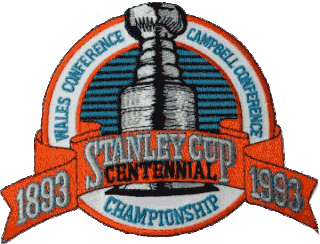 W
WThe 1993 Stanley Cup Finals was the championship series of the National Hockey League's (NHL) 1992–93 season, and the culmination of the 1993 Stanley Cup playoffs. It was contested between the Los Angeles Kings and the Montreal Canadiens. It was the first appearance in the Final for the Kings and the first appearance since the 1920 Stanley Cup Finals for a team based on the west coast of the United States. It was also the 34th and, as of 2020, most recent appearance for Montreal, their first since the 1989 Stanley Cup Finals. The Canadiens won the series four games to one to win the team's 24th Stanley Cup. The year 1993 was the 100th anniversary of the first awarding of the Stanley Cup in 1893, and the first Finals to start in the month of June. The 1993 Canadiens are also the last Stanley Cup championship team to be composed solely of North American-born players. As of 2020, this is the last Stanley Cup Finals won by a Canadian team.
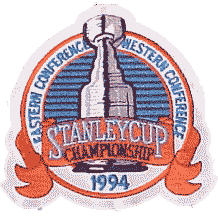 W
WThe 1994 Stanley Cup Finals was the championship series of the National Hockey League's (NHL) 1993–94 season, and the culmination of the 1994 Stanley Cup playoffs. It was contested between the Eastern Conference champion New York Rangers and Western Conference champion Vancouver Canucks. The Canucks were making the club's second Finals appearance, their first coming during their Cinderella run of 1982, and the Rangers were making their tenth appearance, their first since 1979. The Rangers ended their record 54-year championship drought with a victory in game seven to claim the long-awaited Stanley Cup. It was the fourth championship in franchise history. The CBC broadcast of the deciding game seven attracted an average Canadian audience of 4.957 million viewers, making it the most watched CBC Sports program in history to that time. This was the last Stanley Cup Finals with games played in Canada until 2004, and the last to go the full seven games until 2001.
 W
WThe 1995 Stanley Cup Finals was the championship series of the National Hockey League's (NHL) 1994–95 season, and the culmination of the 1995 Stanley Cup playoffs. It was contested by the Eastern Conference champion New Jersey Devils and the Western Conference champion Detroit Red Wings. This was the first of nine consecutive finals with American-based franchises exclusively. New Jersey was making the franchise's first appearance in the Finals, while Detroit returned to the Finals for the first time since 1966. The Devils swept the series four games to none to win their first Stanley Cup, becoming the sixth team to earn a championship having joined the league in 1967 or later. It was the first of four consecutive sweeps in the finals.
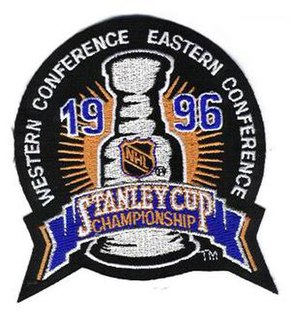 W
WThe 1996 Stanley Cup Finals was the championship series of the National Hockey League's (NHL) 1995–96 season, and the culmination of the 1996 Stanley Cup playoffs. It was contested by the Western Conference champion Colorado Avalanche and the Eastern Conference champion Florida Panthers, two teams in the Finals for the first time. Colorado defeated Florida in a four-game sweep to win their first Stanley Cup becoming the seventh post-1967 expansion team and the second former WHA team to win the Cup. Colorado's Joe Sakic earned the Conn Smythe Trophy as MVP of the 1996 Playoffs.
 W
WThe 1997 Stanley Cup Finals was the championship series of the National Hockey League's (NHL) 1996–97 season, and the culmination of the 1997 Stanley Cup playoffs. It was contested by the Detroit Red Wings and the Philadelphia Flyers. Detroit was in the Finals for the second time in three years while the Flyers were making their first appearance since losing in 1987 to the Edmonton Oilers. Detroit won the series in four games to win the Stanley Cup for the eighth time in franchise history and the first time since 1955; Philadelphia had not won since 1975. Detroit was the last team to win the Cup without having home ice advantage in the Finals and with fewer than 100 points earned during the regular season until 2009.
 W
WThe 1998 Stanley Cup Finals was the championship series of the National Hockey League's (NHL) 1997–98 season, and the culmination of the 1998 Stanley Cup playoffs. It was contested by the Western Conference champion and defending Stanley Cup champion Detroit Red Wings and the Eastern Conference champion Washington Capitals. It was the 105th year of the Stanley Cup being contested. The series was the Capitals' first appearance in a Stanley Cup Finals since the franchise's inception in 1974. The Red Wings won the series for the second year in a row, four games to none. It was the Wings' ninth Stanley Cup, and the most recent time when a Finals concluded with a sweep. This was also the last time until 2002 that a Stanley Cup Finals ended after an NBA Finals in the same season had concluded. Detroit coach Scotty Bowman won his eighth Stanley Cup in that capacity, tying him with former Canadiens coach Toe Blake for the record of most Cups won by a coach.
 W
WThe 1999 Stanley Cup Finals was the championship series of the National Hockey League's (NHL) 1998–99 season, and the culmination of the 1999 Stanley Cup playoffs. It was contested by the Eastern Conference champion Buffalo Sabres and the Western Conference champion Dallas Stars. It was the 106th year of the Stanley Cup being contested.
 W
WThe 2000 Stanley Cup Finals was the championship series of the National Hockey League's (NHL) 1999–2000 season, and the culmination of the 2000 Stanley Cup playoffs. It was contested by the Eastern Conference champion New Jersey Devils against the Western Conference champion and defending Stanley Cup champion Dallas Stars. The Devils were led by captain Scott Stevens, head coach Larry Robinson and goaltender Martin Brodeur. The Stars were led by captain Derian Hatcher, head coach Ken Hitchcock and goaltender Ed Belfour. The Devils defeated the Stars, four games to two.
 W
WThe 2001 Stanley Cup Finals was the championship series of the National Hockey League's (NHL) 2000–01 season, and the culmination of the 2001 Stanley Cup playoffs. It was contested between the Eastern Conference champion and defending Stanley Cup champion New Jersey Devils and the Western Conference champion and Presidents' Trophy-winning Colorado Avalanche. It was Colorado's second appearance in the Finals, and the first since the team won the Cup in 1996. It was New Jersey's third appearance in the Finals and second straight appearance after winning the Cup in the previous year.
 W
WThe 2002 Stanley Cup Finals was the championship series of the National Hockey League's (NHL) 2001–02 season, and the culmination of the 2002 Stanley Cup playoffs. It was contested by the Western Conference champion Detroit Red Wings and the Eastern Conference champion Carolina Hurricanes. It was Detroit's twenty-second appearance in the Finals, their previous appearance being a win in 1998. It was Carolina's first appearance in the Finals in franchise history. Detroit defeated Carolina in five games to win their tenth Stanley Cup championship in franchise history.
 W
WThe 2003 Stanley Cup Finals was the championship series of the National Hockey League's (NHL) 2002–03 season, and the culmination of the 2003 Stanley Cup playoffs. The second-seeded Eastern Conference champion New Jersey Devils defeated the seventh-seeded Western Conference champion Mighty Ducks of Anaheim in seven games and were awarded the Stanley Cup. It was New Jersey's first appearance since 2001 and third in four years. It was Anaheim's first-ever appearance. The Devils defeated the Mighty Ducks in seven games to win their third Stanley Cup in less than a decade.
The 2004 Stanley Cup Finals was the championship series of the National Hockey League's (NHL) 2003–04 season, and the culmination of the 2004 Stanley Cup playoffs. The Eastern Conference champion Tampa Bay Lightning defeated the Western Conference champion Calgary Flames in seven games, becoming the southernmost team to win the Stanley Cup. It was Tampa Bay's first-ever appearance in the final. For Calgary, it was the team's third appearance, and first since their championship season of 1989. Lightning owner William Davidson would soon become the first owner in sports history to win two championships in one year as eight days later, the other team that Davidson owned won the NBA title in five games over the Los Angeles Lakers. This was the last Stanley Cup Final played for two years, as the 2004–05 NHL lockout began three months after the end of this final, lasting over ten months and leading to the cancellation of the 2005 Final, with the league not returning to play for the Cup until 2006.
The 2006 Stanley Cup Finals was the championship series of the National Hockey League's (NHL) 2005–06 season, and the culmination of the 2006 Stanley Cup playoffs. It was contested between the Eastern Conference champion Carolina Hurricanes and the Western Conference champion Edmonton Oilers. It was Carolina's second appearance in the final, the other being in 2002, a loss to the Detroit Red Wings. It was Edmonton's seventh appearance in the Final and their first since their fifth Cup win in 1990. It was also the first finals matchup between two former World Hockey Association franchises. Carolina defeated Edmonton in seven games to win the franchise's first Stanley Cup and become the tenth post-1967 expansion team and third former WHA team to win the Cup. Carolina's 2006 win was also the team's second league championship.
The 2007 Stanley Cup Finals was the championship series of the National Hockey League's (NHL) 2006–07 season, and the culmination of the 2007 Stanley Cup playoffs. It was contested between the Western Conference champion Anaheim Ducks and the Eastern Conference champion Ottawa Senators. It was the second appearance in the Final for Anaheim since 2003, when they lost to the New Jersey Devils. It was the first appearance for the Senators since entering the NHL as an expansion team in 1992. Anaheim defeated Ottawa in five games and were awarded their first Stanley Cup becoming the eleventh post-1967 expansion team to win the NHL championship trophy, and the first Stanley Cup championship for a team from California. This was also the most recent year that both teams that went to the finals had never won the Stanley Cup before until the 2018 Stanley Cup Finals.
 W
WThe 2008 Stanley Cup Finals was the championship series of the National Hockey League's (NHL) 2007–08 season, and the culmination of the 2008 Stanley Cup playoffs. It was contested between the Western Conference champion Detroit Red Wings and the Eastern Conference champion Pittsburgh Penguins. This was Detroit's 23rd appearance in the Final, and its first since winning the Cup in 2002. This was Pittsburgh's third appearance in the Final, and its first since winning consecutive Cup championships in 1991 and 1992. The Red Wings defeated the Penguins four games to two to earn the Stanley Cup. Detroit's Henrik Zetterberg was awarded the Conn Smythe Trophy as the Most Valuable Player of the playoffs.
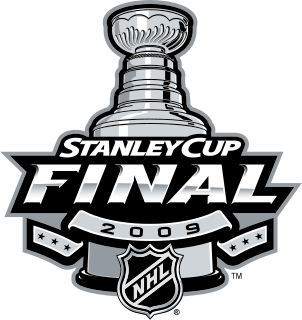 W
WThe 2009 Stanley Cup Finals was the championship series of the National Hockey League's (NHL) 2008–09 season, and the culmination of the 2009 Stanley Cup playoffs. It was contested between the Eastern Conference champion Pittsburgh Penguins and the Western Conference champion Detroit Red Wings. It was Detroit's 24th appearance in the Final and Pittsburgh's fourth appearance in the Final. This was a rematch of the previous year's Stanley Cup Final where Detroit had defeated Pittsburgh in six games. This time, Pittsburgh defeated Detroit in seven games to win their third Stanley Cup in franchise history. Pittsburgh's Evgeni Malkin would win the Conn Smythe Trophy as the Most Valuable Player of the 2009 playoffs, becoming the first Russian-born player to win the trophy.
 W
WThe 2010 Stanley Cup Finals was the championship series of the National Hockey League's (NHL) 2009–10 season, and the culmination of the 2010 Stanley Cup playoffs. It was contested between the Western Conference champion Chicago Blackhawks and the Eastern Conference champion Philadelphia Flyers. It was Chicago's eleventh appearance in the Final and their first since 1992, a loss to the Pittsburgh Penguins. It was Philadelphia's eighth appearance in the Final and their first since 1997, a loss to the Detroit Red Wings. Chicago defeated Philadelphia four games to two to win their fourth Stanley Cup in franchise history.
 W
WThe 2011 Stanley Cup Finals was the championship series of the National Hockey League's (NHL) 2010–11 season, and the culmination of the 2011 Stanley Cup playoffs. The Eastern Conference champion Boston Bruins defeated the Western Conference champion Vancouver Canucks four games to three. The Bruins ended a 39-year Stanley Cup drought with the win. Bruins goaltender Tim Thomas was awarded the Conn Smythe Trophy as the Most Valuable Player of the playoffs.
 W
WThe 2012 Stanley Cup Finals was the championship series of the National Hockey League's (NHL) 2011–12 season, and the culmination of the 2012 Stanley Cup playoffs. The Western Conference playoff champion Los Angeles Kings defeated the Eastern Conference playoff champion New Jersey Devils four games to two, capturing the first Stanley Cup title in the team's 45-year history, dealing the Devils just their second Stanley Cup Finals defeat in five tries and first since 2001. Kings goaltender Jonathan Quick was awarded the Conn Smythe Trophy as the Most Valuable Player of the playoffs.
 W
WThe 2013 Stanley Cup Finals was the championship series of the National Hockey League's (NHL) 2012–13 season, and the conclusion of the 2013 Stanley Cup playoffs. The Western Conference playoff champion Chicago Blackhawks defeated the Eastern Conference playoff champion Boston Bruins in six games to win their fifth Stanley Cup in team history. The Blackhawks also became just the eighth team to win both the Cup and the Presidents' Trophy in the same season. Chicago's Patrick Kane was awarded the Conn Smythe Trophy as the Most Valuable Player of the playoffs.
 W
WThe 2014 Stanley Cup Finals was the championship series of the National Hockey League's (NHL) 2013–14 season, and the culmination of the 2014 Stanley Cup playoffs. The League realigned its divisions prior to the season, and changed the structure of the playoffs, but the championship series remained the same. The Western Conference champion Los Angeles Kings defeated the Eastern Conference champion New York Rangers four games to one to win their second championship in franchise history, marking the first time since 2007 that the championship series was determined in fewer than six games. Their Stanley Cup–winning run of 26 playoff games was later tied by the 2019 St. Louis Blues for the longest of any Stanley Cup–winning team in history.
 W
WThe 2015 Stanley Cup Finals was the championship series of the National Hockey League's (NHL) 2014–15 season, and the culmination of the 2015 Stanley Cup playoffs. The Western Conference champion Chicago Blackhawks defeated the Eastern Conference champion Tampa Bay Lightning four games to two to win their sixth championship in franchise history, and their third title in six seasons.
 W
WThe 2016 Stanley Cup Finals was the championship series of the National Hockey League's (NHL) 2015–16 season, and the culmination of the 2016 Stanley Cup playoffs. The Eastern Conference champion Pittsburgh Penguins defeated the Western Conference champion San Jose Sharks four games to two to win their fourth championship in franchise history. Penguins captain Sidney Crosby was awarded the Conn Smythe Trophy as the most valuable player of the playoffs.
 W
WThe 2017 Stanley Cup Finals was the championship series of the National Hockey League's (NHL) 2016–17 season, and the culmination of the 2017 Stanley Cup playoffs. The Eastern Conference champion and defending Stanley Cup champion Pittsburgh Penguins defeated the Western Conference champion Nashville Predators, four games to two. Penguins captain Sidney Crosby was awarded the Conn Smythe Trophy as the most valuable player of the playoffs for the second consecutive year. The Penguins won the Stanley Cup in their opponent's rink, for the fifth time.
 W
WThe 2018 Stanley Cup Finals was the championship series of the National Hockey League's (NHL) 2017–18 season and the culmination of the 2018 Stanley Cup playoffs. The Eastern Conference champion Washington Capitals defeated the Western Conference champion Vegas Golden Knights four games to one to win their first championship, in their 44th season. The Vegas Golden Knights made the Finals in their first season, while this was the second Finals appearance for the Capitals. This was the first Finals series since 2007 where neither team had previously won the Stanley Cup and the third consecutive year in which a Western Conference team made their Finals debut. This was the first Finals since 2014 to require fewer than six games. Washington captain Alexander Ovechkin was awarded the Conn Smythe Trophy as the most valuable player of the playoffs.
 W
WThe 2019 Stanley Cup Finals was the championship series of the National Hockey League's (NHL) 2018–19 season and the culmination of the 2019 Stanley Cup playoffs. The Western Conference champion St. Louis Blues defeated the Eastern Conference champion Boston Bruins four games to three in the best-of-seven series. It was the Blues' first championship, in their 51st season of play, ending the third-longest championship drought in league history. The Bruins had home-ice advantage in the series with the better regular season record. The series began on May 27 and concluded on June 12. The Blues' Stanley Cup–winning run of 26 playoff games tied the 2014 Los Angeles Kings for the longest of any Stanley Cup–winning team in history.
 W
WThe 2020 Stanley Cup Finals was the championship series of the National Hockey League's (NHL) 2019–20 season and the culmination of the 2020 Stanley Cup playoffs. This series was between the Eastern Conference champion Tampa Bay Lightning and the Western Conference champion Dallas Stars. The Lightning won the best-of-seven series, four games to two, for their second championship in franchise history. The series began on September 19 and concluded on September 28. Due to the COVID-19 pandemic, the entire series was played behind closed doors at Rogers Place in Edmonton. The pandemic resulted in the league suspending the regular season on March 12, 2020, and then scheduling a special 24-team playoff format to be held in two neutral "hub cities" that began on August 1.